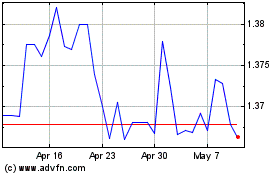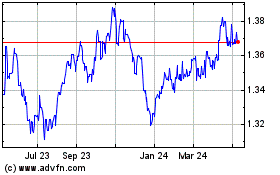Canadian Dollar Weakens As Economic Growth Stalls
September 29 2017 - 5:38AM
RTTF2
The Canadian dollar declined against its major rivals in
European deals on Friday, after a data showed that the nation's
economic growth stalled unexpectedly in July.
Data from Statistics Canada showed that the Canadian GDP was
unchanged on a seasonally adjusted monthly basis in July.
Economists had forecast a reading of 0.1 percent on month. The
economy had expanded 0.3 percent in June. Separate data from the
same agency showed that the industrial product price index rose in
August mainly due to higher prices for energy and petroleum
products.
The index rose 0.3 percent in August, slower than the 0.5
percent increase expected by economists.
This follows a revised 1.6 percent fall in the previous
month.
Crude oil futures inched lower amid renewed concerns about the
global supply glut.
Traders will be paying close attention when Baker Hughes reports
its U.S. rig count figures this afternoon.
Crude for November delivery fell $0.01 to $51.55 per barrel.
The loonie traded mixed in the Asian session. While the currency
rose against the yen and the aussie, it fell against the greenback
and the euro.
Having advanced to a 2-day high of 0.9730 against the aussie at
8:15 am ET, the loonie reversed direction and weakened to 0.9774.
Continuation of the loonie's downtrend may see it challenging
support around the 0.99 zone.
The loonie hit a weekly low of 1.4749 against the euro, down
from a high of 1.4639 hit at 5:00 pm ET. Further downtrend may see
the loonie challenging support around the 1.49 area.
Flash data from Eurostat showed that Eurozone inflation held
steady in September.
Inflation came in at 1.5 percent in September, the same rate as
seen in August. Economists had forecast the rate to rise slightly
to 1.6 percent.
The loonie reversed from an early high of 1.2417 against the
greenback, weakening to 1.2476. The next possible support for the
loonie is seen around the 1.26 mark.
Data from the Commerce Department showed that U.S. personal
income and spending both rose in line with economist estimates in
the month of August.
The Commerce Department said personal income edged up by 0.2
percent in August after rising by a downwardly revised 0.3 percent
in July.
The loonie dropped to 89.99 against the Japanese yen, a level
not seen since September 15. This marks a 0.7 percent decline from
a 2-day high of 90.65 hit at 2:30 am ET. On the downside, 88.00 is
likely seen as the next support for the loonie.
Data from the Ministry of Land, Infrastructure, Transport and
Tourism showed that Japan's housing starts declined unexpectedly in
August.
Housing starts decreased 2 percent year-on-year in August,
confounding expectations for an increase of 0.6 percent. Housing
starts had declined 2.3 percent in July.
Looking ahead, the University of Michigan's final consumer
sentiment for September is due shortly.
At 11:00 am ET, Federal Reserve Bank of Philadelphia President
Patrick Harker speaks about the economic outlook and financial
technology at the Fintech conference hosted by the Federal Reserve
Bank of Philadelphia.
US Dollar vs CAD (FX:USDCAD)
Forex Chart
From Mar 2024 to Apr 2024

US Dollar vs CAD (FX:USDCAD)
Forex Chart
From Apr 2023 to Apr 2024
